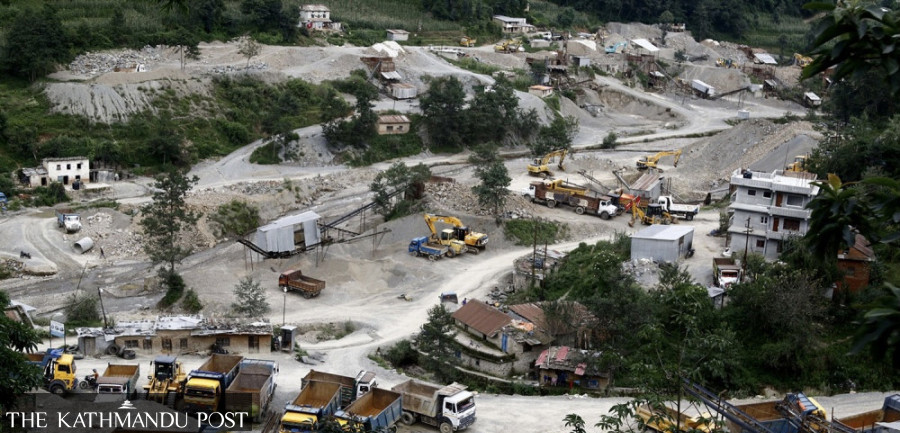Money
Order to close crushers affects development works
The home ministry, through a circular earlier this month, ordered district administrations to shut down all illegal crusher plants.
Pawan Pandey
Development work across the country has been adversely affected by the shortage of construction materials after the Home ministry earlier this month issued a circular ordering closure of all “illegal” crusher plants, say contractors.
“More than 80 percent of development projects, including national pride projects that are being implemented through foreign grants, have come to a halt after the circular,” said Rabi Singh, the president of the Federation of Contractors’ Association of Nepal.
Singh claimed that the factory prices of construction materials such as sand and pebbles have gone up three-fold and the total cost of the materials including transportation and other charges have increased by at least 30 percent.
“The factory price of sand and pebbles was Rs4,000 per truckload before January 4, but it has now reached Rs11,000,” Singh said. “The overall cost per truckload, including transportation and other costs, has increased to Rs31,000 from Rs22,000.”
The ministry, through the circular, directed the District Administration Offices to immediately shut down crusher plants (involved in quarrying and processing of stone, gravel and sand) that are operating without registering, renewing, and obtaining an operating permit.
The ministry also asked the offices to investigate and immediately shut down quarry works that have continued even after the completion of various development projects, for which the plants and contractors concerned were granted permission to extract stone, gravel and sand.
The circular has benefited a handful of crusher plants but forced most others to shut down, according to Singh. “It looks like a few influential crusher plant owners having nexus with top officials in the police administration and political parties have influenced the court as well.”
Fadindra Mani Pokharel, spokesperson at the Home Ministry, said the ministry has only followed the rules and the Supreme Court order.
Pokharel claimed the ministry’s decision has not affected the plants that are on the right side of the law.
“The existing guidelines on crusher plants are neither practical nor implementable,” Singh of the FCAN claimed.
“The issues related to the guidelines are something for the Ministry of Federal Affairs and General Administration, Ministry of Industry, Commerce and Supply, Prime Minister’s office and all other stakeholders concerned to sort out,” Pokharal added.
The Supreme Court in June last year had issued an interim order not to implement the amended provisions on the standards for extraction, sales and management of stones, pebbles and sand.
The amended standards introduced in May last year had allowed crusher plants to be set up even closer to forests, human settlements, rivers, highways, religious, cultural and archaeological sites and transmission lines than ever before.
While environmentalists had told the Post that such policies would have adverse effects on the environment, experts and industry insiders had accused the government of tweaking rules to benefit a certain few close to power corridors.
Excessive extraction of sand and stones near the rivers, villages, forests, roads, and bridges poses a greater risk to lives and property.
The new standards had reduced the mandated distance between a crusher plant and the right-of-way of the highway to 200 metres in hill districts. The same distance should be maintained between crusher plants and river banks in hill districts
This distance in the Tarai has been left unchanged at 500 metres. It was the first time separate standards were set for the hilly and Tarai regions.
Earlier, such distance was 500 metres for both hill and Tarai regions.
The amendment also allowed crusher plants to be set up 500 metres away from a forest, bridge and large human settlement in the hilly region.
In the Tarai, crusher plants could be set up 500 metres from a forest or a bridge, but when it comes to large human settlements, they should be one kilometre away.
The provision allowing crusher plants at 500 metres from a highway bridge was continued in the amended standards.
When it comes to human settlements and forests, the old standards said crusher plants could only be set up two kilometres away from a dense human settlement and forest.
Another concerning provision in the amendment was allowing crusher plants to operate as close as 500 metres from archaeological, religious and cultural sites and educational and health institutions in hill districts.
As per the new standards, such distance should be one kilometre in the case of Tarai. Earlier, crusher plants were supposed to remain at least two kilometres from such sites.
The shortage of construction materials at a time of the year when the development works pick a pace is a concerning matter for us, said Bhimarjun Adhikari, spokesperson at the Department of Roads.
“Crusher plants should be allowed to operate in line with the law,” said Adhikari. “But the government must be mindful about the broader impact of its decisions.”
“The government could have provided an alternative to prevent the shortage of construction materials,” Adhikari added.
The capital expenditure in the current fiscal which began mid-July last year has only been 14 percent as of Tuesday, according to statistics of the Financial Comptroller General Office.
Of the target of Rs380 billion, the government has only been able to spend around Rs54 billion.
Arjun Jung Thapa, director general of the Department of Roads, took to social media on Monday to show his frustration regarding the government decision.
“Major road projects including the ones in the Kathmandu Valley have been affected by the Home Ministry’s decision,” posted Thapa on Facebook. “The work at the Nagdhunga Tunnel, being carried out by a Japanese contractor, has stopped due to the lack of sand. The contractors are mulling over asking the government for compensation, which they should be given as per the contract agreement.”
Thapa has concluded his post on a sarcastic note saying whether we should bring riverbed materials from the moon.
Singh, the president of the FCAN, said the government should create crusher and quarry zones in the country for a systematic extraction of construction materials and each local government should make its own guidelines for regulating the crusher industry.
“Instead of imposing the same provisions for all parts of the country, every local government should make its own practical guidelines,” Singh said.




 20.12°C Kathmandu
20.12°C Kathmandu














